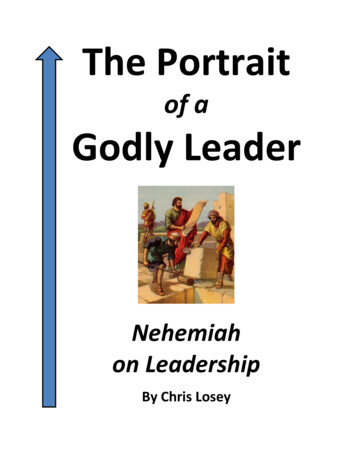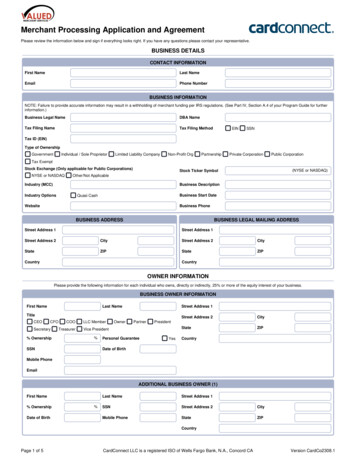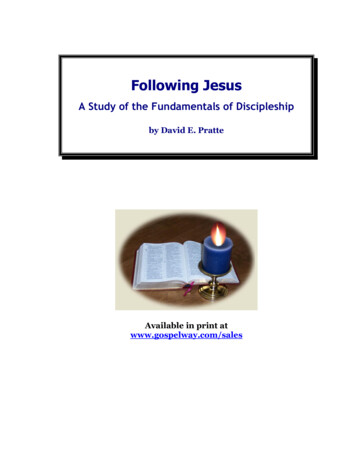
Transcription
The Portraitof aGodly LeaderNehemiahon LeadershipBy Chris Losey0
1
Copyright 2012Christopher R. LoseyIDM - Institute of Disciple MakingChris Losey grew up in Calistoga,California. He received his Bachelor ofScience degree from the United StatesMilitary Academy at West Point, NewYork, in 1973. After serving for fiveyears as an infantry officer in the Army,he resigned his commission and returnedto school receiving his Master ofDivinity degree from Western Conservative Baptist Seminary in Portland, Oregon in 1982.After graduation Chris returned to the military where he served as a chaplain in the AirForce retiring in 1994. The same year Chris began 20 more years of service as the SeniorPastor of Valley Baptist Church in San Rafael, California, retiring again in 2014. Chrisand Sharon have been married 42 years and now reside in Elk Grove, CA where Chriscontinues to minister through his website, www.chrislosey.com, and by serving in variousvolunteer capacities at Creekside Christian Church of Elk Grove. He and Sharon loveliving near grandchildren, and enjoy walking together and golfing.Bible Quotes - All Bible quotes unless otherwise noted are taken from the New American Standard Bible(NASB), Copyright 1960, 1962, 1963, 1968, 1971, 1972, 1973, 1975, 1977, and 1995 by the LockmanFoundation. All underlining and highlighting of Bible verses are done by the author for emphasis and arenot contained in the original text.Artwork - All clipart is from clipart.com and used by permission.Questions or Ordering - If you have questions or wantto order more booklets, please call 415-479-3390.2
Dedicated to thosewho want to learnhow to be godly leaders3
IntroductionThe world needs good leaders. More importantly, the world needs godlyleaders. Therehave been a number of godly leaders throughout history. Muchcan be learned from their lives. This study examines the book of Nehemiah inthe Old Testament and looks at the life of the man Nehemiah in order to findout what it takes to be a godly leader. To begin, let’s take a brief quiz to seehow much you know about Nehemiah and this insightful book from the OldTestament.Questions1. What other book in the Old Testament is combined in the Hebrew Bible as one volumewith the Book of Nehemiah?2. What was Nehemiah’s profession and what does his name mean?3. Who was the person God used to oversee the reconstruction of the Jewish temple?4. What was the name of the scribe/priest who God used to restore the Jewish people?5. What person did God use to oversee the rebuilding of the wall around Jerusalem?6. In what empire were Zerubbabel, Ezra, and Nehemiah living before they returned toJudah to do the tasks God called them to do?7. What was the name of the Babylonian king who conquered Judah and took the Jewsinto Babylonian captivity for 70 years?8. What kingdom conquered the Babylonians?9. Which Persian king put out the decree for the temple in Jerusalem to be rebuilt?10. In what year did the Persian Empire defeat the Babylonians?11. What are the names of 5 kingdoms mentioned in the Bible besides the Jews?Answers1. Ezra.2. He was the cupbearer to the Persian King Artaxerxes. His name means “Yah comforts.”3. Zerubbabel.4. Ezra.5. Nehemiah6. Babylonian Empire.7. Nebuchadnezzar.8. The Persians.9. Cyrus.10. 539 BC.11. Assyrian, Babylonian, Persian, Greek, Roman4
Timetable722 BC - Fall of the Northern Kingdom to Assyria - Jews scattered605, 597, 586 - Nebuchadnezzar’s three attacks on Jerusalem605 - Nebuchadnezzar drove Egypt out of Palestine - took Daniel and his friends captive597 - Nebuchadnezzar took the young king and his family and 10,000 Jews into captivity586 - Southern Kiingdom completely falls to King Nebuchadnezzar(70 year captivity prophesied by Jeremiah (Jer 29:10) from first deportation in 605BC until the rebuilding of the temple foundation by the returning exiles in 536 BC - pg649, Bible Knowledge Commentary)539 BC - Capture of Babylon by the Persians (Cyrus I - 559-530 BC) - Daniel 5:30538,37 - Degree by Cyrus to rebuild the temple - Ezra 1:1-4537,8 BC - First Group returns under Sheshbazzar - Zerubbabel is with them - Ez 1:11537 BC - Building of altar - Ezra 3:1536 - Work on temple begun - Ezra 3:8536-530 - Opposition during Cyrus’ reign - Ezra 4:1-5530-520 - Temple work ceased - Ezra 4:24520 - Work on temple renewed under Darius (522-486 BC) - Ez 5:2, Hag 1:14516 BC - Temple completed - Ezra 6:15458 BC - Second Group w/ Ezra returns during the 7th year of Artaxerxes (465-424 BC)458 BC - Apr - Ezra departs from Babylon - Ezra 7:6-9Aug - Ezra arrives in Jerusalem - Ezra 7:8,9Dec - People assemble - Ezra 10:9445 BC - Nehemiah- Approaches the king (Artaxerxes I - 20th year) Mar-Apr - Neh 1:1-2:1- Arrives in Jerusalem - Aug? - Neh 2:11- Completion of the Wall - Oct - Neh 6:15- Public assembly - Neh 7:73-8:1- Feast of booths - Neh 8:14- Fast - Oct - Neh 9:1433 BC - 32nd year of Artaxerxes - Neh 5:14, 13:6432 BC - Third Group returns under Nehemiah Reigns of KingsNebuchadnezzar - Babylonian EmpireCyrus I - 559-530 BC - PersianCambyses - 530-522 BC - PersianSmerdis - 522 BCDarius - 522-486 BC - PersianXerxes - 485-465 - PersianArtaxerxes I - 465-424 BC – Persian5
Some key dates in Jewish history722 BC - the fall of Israel (northern kingdom) to Assyria605, 597, 586 BC - the fall of the Judah (southern kingdom) to Babylonia539 BC - the fall of Babylonia to the Persians538,7 BC - Decree by Cyrus (Persian King) to rebuild the Jewish temple538,7 BC - The first group of exiles return with Zerubbabel536 BC - Temple work begun516 BC - Temple completed458 BC - Second group of exiles return to Jerusalem with Ezra445 BC - Nehemiah returns to Jerusalem and the wall is finished by the end of the yearThree key returnsReferring to the three key returns of the Jews from Babylonian Exile to the Holy Land.538,7 BC - Zerubbabel returned to rebuild the temple.458 BC - Ezra returned to restore the people.445 BC - Nehemiah returned to rebuild the wall.Some important principles1. God’s will sometimes takes longer than we would like- a thousand years is as a day to Him2. God uses a variety of people to accomplish His will- realize you are important but only one small piece of the puzzle3. God’s will will be done- the temple, people, and wall were rebuilt4. People can save themselves a lot of trouble if they simply follow God in the first place.- the Jews were a hardhearted people and God had to discipline them- God then withheld His blessing from them6
SOME QUOTES ON LEADERSHIPINTEGRITY IN LEADERSHIP - In order to be a leader a man must have followers. And tohave followers, he must have their confidence. Hence the supreme quality of a leader isunquestionably integrity. Without it, no real success is possible, no matter whether it ison a section gang, on a football field, in an army, or in an office. If a man's associates findhim guilty of phoniness, if they find that he lacks forthright integrity, he will fail. Histeachings and actions must square with each other. The first great need, therefore, isintegrity and high purpose. Dwight D. Eisenhower, Bits & Pieces, September 15, 1994, p.4.QUALITIES OF A LEADER - Peter Drucker offers insightful guidance to the church when hecalls leadership a peak performance by one who is "the trumpet that sounds a clearsound of the organizations' goals." His five requirements for this task are amazinglyreliable and useful for those who dare to lead churches:(1) a leader works;(2) a leader sees his assignment as responsibility rather than rank or privilege;(3) a leader wants strong, capable, self-assured, independent associates;(4) a leader creates human energies and vision;(5) a leader develops followers' trust by his own consistency and integrity.H.B. London, Jr. and Neil B. Wiseman, Pastors at Risk, Victor Books, 1993, pp. 227-228.WHAT LEADERS MUST BE WILLING TO DO - Myron Rush identifies tough issuesfacing every Christian leader in The New Leader. We are wise to ponder them slowly.- You must be willing to stand alone.- You must be willing to go against public opinion in order to promote what you believe.- You must be willing to risk failure.- You must become master of your emotions.- You must strive to remain above reproach.- You must be willing to make decisions others don't want to make.- You must be willing to say no at times, even when you'd like to say yes.- You must sometimes be willing to sacrifice personal interests for the good of the group.- Never be content with the average; you must always strive for the best.- People must be more important to you than possessions.- You will have to work harder to keep your life in balance than people do who are notleaders.Paul Borthwick, Leading the Way, Navpress, 1989, pp. 177-178.7
THE KIND OF LEADERS THAT ARE NEEDEDThe world needs leaders.who cannot be bought;whose word is their promise; who put character above wealth;who possess opinions and a will; who are larger than their vocations;who do not hesitate to take chances;who will not lose their individuality in a crowd;who will be honest in small things as well as in great things;who will make no compromise with wrong;whose ambitions are not confined to their own selfish desires;who will not say they do it "because everybody else does it";who are true to their friends through good report andevil report, in adversity as well as in prosperity;who do not believe that shrewdness, cunning, andhardheadedness are the best qualities for winning success;who are not ashamed or afraid to stand for the truthwhen it is unpopular, who can say no with emphasis,although the rest of the world says yes.Paul Borthwick, Leading the Way, Navpress, 1989, pp. 19-20.Leadership IllustrationA traveler in Europe was amazed at the number of famous leaders in history who werefrom Europe - Napoleon, Alexander the Great, Winston Churchhill. In one city as he waswalking in an historic park the man noticed an elderly man sitting at a park bench readingthe daily paper. The tourist thought that if anyone would know what famous peoplecame from this city, surely the elderly man would know. The tourist got the elderly man’sattention and explained that he was a tourist and said, “Sir, I am a student of history. Canyou tell me if there were any famous leaders born in your town?” The elderly manthought for a moment and then looked up and said, “No famous leaders born here, onlybabies.”More Quotes on Leadership- leaders are made not born- lead, follow, or get out of the way- a person who would be a good leader must first be a good follower- the trouble with being a leader today is that you can't be sure whether people arefollowing you or chasing you8
The Portrait of a Godly LeaderHere are thirty plus things that marked Nehemiah’s life. Together they paintwhat might be called The Portrait of a Godly Leader. We would do well toemulate the qualities in our own lives.Note that AGL is an abbreviation for “A Godly Leader.”1. A godly leader (AGL) looks beyond himself and is concerned about others(Neh 1:1-3) - compassionate1The words of Nehemiah the son of Hacaliah. Now it happened in the monthChislev, in the twentieth year, while I was in Susa the capitol, 2 that Hanani,one of my brothers, and some men from Judah came; and I asked themconcerning the Jews who had escaped and had survived the captivity, andabout Jerusalem. 3 And they said to me, "The remnant there in the provincewho survived the captivity are in great distress and reproach, and the wall ofJerusalem is broken down and its gates are burned with fire."Nehemiah was living in Susa. He obviously had great potential because herose to hold the position of cupbearer to the king of Babyon. Cupbearerschose and tasted the king’s drink before the king did to be sure it wasn’tpoisoned. In his position as cupbearer it would have been easy for Nehemiahto be content and not care about other Jews. His job was relatively secure, butNehemiah was concerned about the Jews who had escaped and survived thecaptivity, and he was also concerned about the Jews beloved city, Jerusalem.Reflection Questions1. Who are you leading today, and how are they doing?2. Do you inquire about their situation either by asking them directly orasking others who would know?3. Would you say that you have a genuine concern for other people? If so,how are you showing it? If not, what do you need to do to change?9
2. AGL (A godly leader) feels the hurts of others (Neh 1:4a) - empathetic4a Now it came about when I heard these words, I sat down and wept andmourned for days.Nehemiah not only became aware of the plight of the Jews, he empathizedwith them. When he heard about what the Jews back in Jerusalem were goingthrough, and the condition of the city, he sat down and wept. His weepingwasn’t for a moment or even several minutes, but for days. He cared deeplyabout the Jews and his homeland.If we are going to lead people we need to care deeply about what affectsthem. If their plight brings tears to our eyes, it is likely that we care enough tohelp them.Reflection Questions1. Do you know the hurts and challenges of those you serve?2. What are some of those hurts or challenges?3. How have you shown empathy for others in recent months?4. When is the last time you shed a tear for someone else’s pain?10
3. AGL fasts and prays realizing that God is the One who can ultimately solvepeople’s problems and meet their needs (Neh 1:4b-6) – has spirituality4band I was fasting and praying before the God of heaven. 5 And I said, "Ibeseech Thee, O LORD God of heaven, the great and awesome God, whopreserves the covenant and lovingkindness for those who love Him and keepHis commandments, 6 let Thine ear now be attentive and Thine eyes open tohear the prayer of Thy servant which I am praying before Thee now, day andnight, on behalf of the sons of Israel Thy servantsNehemiah fasted and prayed for his countrymen and country. This againshowed the depth of his love and concern for them. Fasting and praying takestime, and by doing so, Nehemiah was making a clear statement to God that heknew God alone could help them. God might choose to work throughNehemiah, but it was still God at work.When we know of people’s needs, it is helpful to picture ourselves in theirpredicament. This helps us better understand the impact their need is havingon them. It is important that we consider whether or not we should fast andpray for them as we lift their needs before God. When God sees us fasting andpraying He sees our sincerity and our dependence on Him.Reflection Questions1. Do you fast and pray about the needs of others?2. Do you realize that God is the One who can ultimately help them even ifHe uses you to do it?3. Is there anything you know of that you should be fasting and prayingabout concerning those you serve?11
4. AGL (a godly leader) sees himself as a servant (Neh 1:6a) – is humble6let Thine ear now be attentive and Thine eyes open to hear the prayer ofThy servant which I am praying before Thee now, day and night, on behalf ofthe sons of Israel Thy servants.Nehemiah saw himself as God’s servant. He even called the Jews, God’sservants. It was Nehmiah’s intent to serve the Jews by helping meet some oftheir present needs.So often people in leadership want to be served, but they are actually calledto serve those under their care. We serve by helping people in whatever waywe can. Whether it is leading our family, a ministry, or business, leaders arecalled to be servant-leaders. A servant leader does not look for ways thatothers can serve him, but for ways he can lighten the load of those under hiscare. In the military I remember this happening many times whenCommanders would serve their soldiers in the dining hall on key holidays, orwork alongside them for a time in order to boost morale and betterunderstand what each soldier did.We need to serve those under our care by meeting their needs in creativeways. The Christian life is a life of service.Reflection Questions1. Do you see yourself as a servant?2. Do you think that the people under your care view you as a servant?Why or why not?3. What have you done to demonstrate that you serve the Lord andothers?4. What could you do in the next few weeks to demonstrate your role asservant?12
5. AGL admits his mistakes & confesses his sins (Neh 1:6b-7) – is transparent6let Thine ear now be attentive and Thine eyes open to hear the prayer of Thyservant which I am praying before Thee now, day and night, on behalf of thesons of Israel Thy servants, confessing the sins of the sons of Israel which wehave sinned against Thee; I and my father's house have sinned. 7 "We haveacted very corruptly against Thee and have not kept the commandments, northe statutes, nor the ordinances which Thou didst command Thy servantMoses.In his prayer, Nehemiah confessed his sins and the sins of the Jews to God.They had acted corruptly and had not kept His commandments.A godly leader realizes that he is not perfect. He willingly confesses his sins toGod. Both sins of commission; what he has done wrong, and sins of omission,things he should have done but didn’t.Reflection Questions1. Do you regularly confess your sins to God?2. When is the last time you did so?3. Take some time right now to let the Spirit search your heart and bringanything to mind that needs confessing.13
6. AGL wrestles spiritually with God (Neh 1:8-10) – is bold8"Remember the word which Thou didst command Thy servant Moses, saying,'If you are unfaithful I will scatter you among the peoples; 9 but if you returnto Me and keep My commandments and do them, though those of you whohave been scattered were in the most remote part of the heavens, I will gatherthem from there and will bring them to the place where I have chosen to causeMy name to dwell.' 10 "And they are Thy servants and Thy people whom Thoudidst redeem by Thy great power and by Thy strong hand.Nehemiah wrestled with God by reminding God of His promise not only toscatter disobedient people, but to gather faithful ones. As Nehmiah wrestled,he showed great respect for God by sighting several of God’s attributes.A godly leader is one who wrestles spiritually with God. He wrestles with Godon behalf of those under his care. Remember Jacob who wrestled with theangel and would not let go until he received a blessing? It is OK for us to say,“God although we are imperfect we are seeking to serve You now and wewant and need Your favor and blessing!Reflection Questions1. Do you wrestle with God in prayer concerning those you serve?2. If so, when is the last time you did? Was there any discernable outcome?3. What needs has God used you to meet?14
7. AGL boldly yet humbly makes his desires known to God (1:11) - lives byfaith11"O Lord, I beseech Thee, may Thine ear be attentive to the prayer of Thyservant and the prayer of Thy servants who delight to revere Thy name, andmake Thy servant successful today, and grant him compassion before thisman." Now I was the cupbearer to the king.Nehemiah boldly asked God to help the Jews who were in need, and he askedGod to guide and direct him as he spoke to the king on their behalf.Godly leaders ask God for help. They know their limitations and the fact thatGod is the one who gives ultimate success. Sometimes it seems that ourenemies have lots of success. We need to ask God for His success.Reflection Questions1. Are you regularly asking God to give you and others success?2. What success has He given you so far?3. Right now spend some time praising God and letting Him know theneeds of others and your own needs. List those needs in the spaceprovided below.15
8. AGL doesn’t wear his emotions on his sleeve (Neh 2:1,2) – is self-controlled1And it came about in the month Nisan, in the twentieth year of KingArtaxerxes, that wine was before him, and I took up the wine and gave it tothe king. Now I had not been sad in his presence. 2 So the king said to me,"Why is your face sad though you are not sick? This is nothing but sadness ofheart." Then I was very much afraid.Nehemiah kept his great sadness about the plight of the Jewish people incheck as he poured out is heart to God. He allowed God to be his primarycomforter. Nehemiah felt deeply about the predicament of his fellowcountrymen, but knew the importance of maintaining a professionalcountenance before the king of Persia as he served the king as personalcupbearer.How do we know that Nehemiah maintained a professional demeanor? Verseone of chapter one says that Nehemiah learned about the plight of his fellowJews in Judah in the month of Chislev. Chislev in the Hebrew calendarcorresponds to November-December in our western calendar. WhenNehemiah heard the bad news he wept and mourned for days. But we alsoknow it wasn’t until the month of Nisan (March-April) that the king noticedNehemiah’s sadness. Up until then Nehemiah had not been sad in thepresence of the king. Even though the plight of the Jews weighed heavily onhis heart, he dealt with his sadness in ways that did not interfere with hiswork. But Nehemiah was human. His sadness did finally show, and the kingquestioned him about it.It is interesting to note Nehemiah’s reaction when the king noticed hissadness. Nehemiah said in verse two of chapter two that he felt very muchafraid. Why would Nehemiah be fearful? Because kings in general expectedtheir servants to leave their personal problems at home. An unprofessionalcountenance or a sloppy work eithic in the presence of the king could cost aperson his life.16
Have you ever met a bleeding heart; someone who always lets his emotionsshow. It is easy to get tired of being around that type of person. Although allof us have emotions, we must work at keeping them under control. Peoplewho constantly let their emotions show, usually make poor leaders. Peoplewant to follow leaders who have emotions, but who keep them in check.They want leaders who can deal with their hurts without becoming emotionalyo-yos. That is not to say Christians are always to hide their pain. IndeedScripture tells us to bear one another’s burdens (Gal 6:2). There are timeswhen it is wise to let your hurts be known and to ask for help. But people whonever learn to deal effectively with their own problems become known ashigh-maintenance people, or people who are emotionally needy. Almost noone wants to follow them. Conversely, people want to follow those theyperceive to be emotionally strong and steady.Reflection Questions1. Do you wear your emotions on your sleeve or have you learned to takethem to God first? (Perhaps He wants you to share with others, ormaybe He wants you to keep them to yourself for a time.)2. Have you asked God for permission to share your need and thenfollowed His prompting in your heart?3. Do people see you as an emotionally needy or high maintenanceperson? If you are emotionally needy, have you found that people arereluctant to follow you?Learn to be strong in the Lord and to keep your emotions under control, andGod will bless you.17
9. AGL has respect for authority (Neh 2:3a,5) – is respectful3Let the king live forever. 5 If it please the king, and if your servant has foundfavor before you.Not only did Nehemiah have his emotions under control, he had respect forauthority. When questioned by the king, Nehemiah first said, “Let the king liveforever.” This was a statement of honor. Even though Nehemiah had animportant position as the cupbearer of the king, he showed deep respect forthe king who was in authority over him.No matter how powerful a person becomes or to what height he rises, hedoes well to realize that those in positions of authority are to be respected.Sometimes when people rise to positions of prominence like being cupbearerto the king, it might be easy for them to lose sight of the fact that they, too,are a servant and must show respect for those who are in authority overthem.I am personally offended when I hear people refer to the president by his lastname rather than by saying Mr. President. I am troubled when I see a newsclip where people are throwing things at policemen and calling them names.God has placed different people in positions of authority and we need to berespectful of them even if we disagree with their decisions. If we want to beeffective leaders we need to treat all people with respect. As we do, we willfind that we, too, will find that others will be more willing to treat us withrespect in our position of leadership.Reflection Questions1. Do you show proper respect for those in authority?2. What are some ways that you show respect? List them below.3. What could you do better to show respect to others?18
10. AGL (A Godly Leader) waits for God’s timing (Neh 2:3) – has patience3And I said to the king, "Let the king live forever. Why should my face not besad when the city, the place of my fathers' tombs, lies desolate and its gateshave been consumed by fire?"It is obvious based on Nehemiah’s response to the king that Nehemiah hadthought deeply about the plight of his countrymen and how he could helpchange it. From the beginning Nehemiah probably was looking for anappropriate opening to bring up the matter to the king. He was waiting forGod’s timing. He wanted to be sure he didn’t rush into something before heactually could help. In order to get the help that was needed, Nehemiah mayhave thought he needed to take his concern to the king. When and how to doit was the question. After all, King Artaxerxes (the king Nehemiah served) wasthe one who sent the order to Jerusalem to stop the work (Ezra 4:8-21) whenit was brought to his attention that completing the work might encourage theJews once again to rebel and assert their independence.Even though Nehemiah was not trying to show his emotions before the king,when the king questioned Nehemiah about his sadness, Nehemiah saw it ashis opening to share. He then said, "Let the king live forever. Why should myface not be sad when the city, the place of my fathers' tombs, lies desolateand its gates have been consumed by fire?" I imagine as Nehemiah said thesewords he hoped the king would not take offense, but simply realize how muchNehemiah, a Jew, cared about his fellow Jews and the city of Jerusalem.Indeed the king understood perfectly what Nehemiah said and inquired howhe as king might help.If we want to be effective leaders we need to wait for God’s timing. We maywant to rush into a particular project to fix something in our sphere ofleadership, but we must be sure that we only move forward when God givesus the green light.Reflection Question1. How well do you wait for God’s timing? How could you improve?19
11. AGL surrounds everything he does with prayer (Neh 2:4) – prays4Then the king said to me, "What would you request?" So I prayed to the Godof heaven.After Nehemiah explained his sadness the king responded in an amazing way.King Artaxerxes said, “What would you request?” As the king offered his help,Nehemiah probably saw another huge opening to share his plan for helpingthe Jews. Before he shared, however, Nehemiah said that he first prayed tothe God of heaven. This is an indication that Nehemiah surrounded everythinghe did with prayer. Not only did the negative news about the Jews driveNehemiah to his knees causing him to fast and pray, but even the positiveresponse of the king caused him to pray.One question arises. What kind of prayer did Nehemiah pray? Did he drop tohis knees in front of the king and begin praying to the God of heaven? Asmany of us do, Nehemiah probably quickly prayed in his mind to God in thepresence of Artaxerxes. It is doubtful if Artaxerxes even knew what was goingon. Although we don’t know for sure, I suspect Nehemiah’s prayer wassomething like, “Thank You, God, for opening up this door of opportunity forme to share with the king. Give me wisdom to say the right thing so the kingwill hear and respond favorably. AMEN” Such a prayer could be fired up toheaven in just a few seconds.The point is, if we want to be effective leaders we need to follow Nehemiah’sexample and surround everything we do in prayer. We need times ofextended prayer like in Nehemiah chapter one when Nehemiah got thenegative report about the plight of the Jews. We also need bullet prayersthroughout the day as we are confronted with various challenges. We are toobey the biblical injunction in 1 Thessalonians 5:17 to pray without ceasing.Reflection Questions1. Would you consider yourself a person of prayer? Why?2. Do you pray first when needs arise or only when you can’t fix them?20
12. AGL articulates his desires to others (Neh 2:5) – a concise communicator5And I said to the king, "If it please the king, and if your servant has foundfavor before you, send me to Judah, to the city of my fathers' tombs, that Imay rebuild it."After praying, Nehemiah began to articulate his desires to the king, and he didit with great clarity. Again, showing respect for authority Nehemiah said, "If itplease the king, and if your servant has found favor before you, send me toJudah, to the city of my fathers' tombs, that I may rebuild it." Nehemiah’srequest was bold. It would mean that he would need to take a leave ofabsence from his duties as cupbearer. He asked to be sent back to Judah inorder to help rebuild the city of Jerusalem.I believe that Nehemiah was able to articulate his desires clearly because hehad been working on a plan well in advance. He had already figured out whathe wanted to say and was just looking for the opportunity to say it. Theopportunity came and Nehemiah stepped to the plate and hit a home run.If we want to be effective leaders, we too, need to be able to articulate clearlyto those who can help us, exactly what needs to be done in order to movethings forward in our sphere of leadership.Reflection Questions1. Do you consider yourself a clear and effective communicator? Why orwhy not?2. How do you think others would rate you in your ability to clearlycommunicate your desires and i
The world needs good leaders. More importantly, the world needs godly leaders. Therehave been a number of godly leaders throughout history. Much can be learned from their lives. This study examines the book of Nehemiah in the Old Testament and looks at the life of the man Nehemiah in order to find










